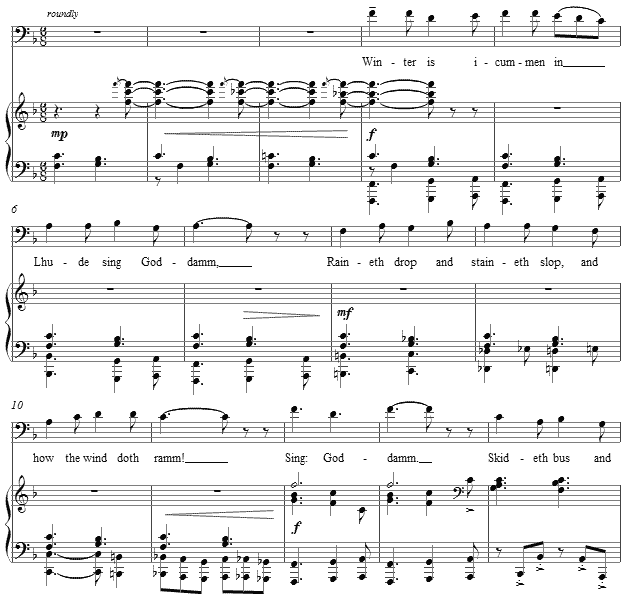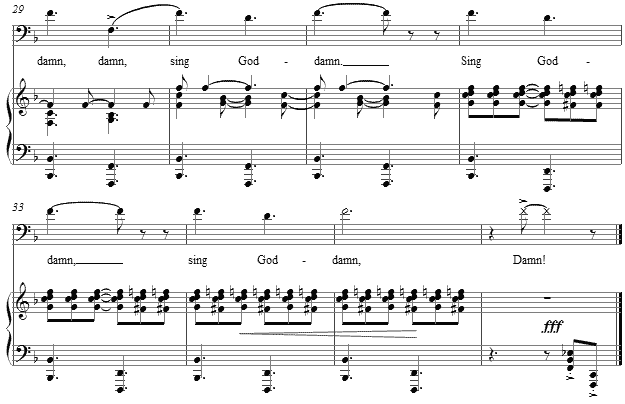Music and Texts of GARY BACHLUND Vocal Music | Piano | Organ | Chamber Music | Orchestral | Articles and Commentary | Poems and Stories | Miscellany | FAQs |
Ancient Music - (1991)

Ezra Pound
for baritone and piano
Winter is icumen in, [ 1 ]
Lhude sing Goddamm, [ 2 ]
Raineth drop and staineth slop,
And how the wind doth ramm!
Sing: Goddamm.
Skiddeth bus and sloppeth us,An ague hath my ham.
Freezeth river, turneth liver,
Damm you; Sing: Goddamm.
Goddamm, Goddamm, 'tis why I am, Goddamm,
So 'gainst the winter's balm.
Sing goddamm, damm, sing goddamm,
Sing goddamm, sing goddamm, DAMM.

Ezra Pound
Ezra Loomis Pound (1885-1972) studied languages at the University of Pennsylvania, and befriended there the young William Carlos Williams (1883-1963), who gained later fame as a poet in New York's avant-garde circles. From 1903 to 1906 Pound studied Anglo-Saxon and Romance languages at Hamilton College. In 1907 his teaching career was cut short at Wabash College in Crawfordsville, Indiana, when he had entertained an actress in his room. He helped Wyndham Lewis, T. S. Eliot and James Joyce to publish their works in the magazines Egoist and Poetry. When he worked as W. B. Yeats' secretary, he started a correspondence with Joyce. Pound wrote on Joyce on various magazines, collected money for him, and even sent spare clothes for him. Pound also played crucial role in the cutting of Eliot's The Waste Land. Eliot dedicated to work to him, as il miglior fabbro ("the better maker"). Pound has been called the 'inventor' of Chinese poetry for our time. Beginning in 1913 with the notebooks of the Orientalist Ernest Fenollosa, he pursued a lifelong study of ancient Chinese texts, and translated among others the writings of Confucius. Pound's translations based on Fenollosa's notes, collected in Cathay (1915), are considered among the most beautiful of Pound's writings.
Pound believed that poetry is the highest of arts. He challenged many of the common views of his time and spent 12 years in an American mental hospital in Washington, D. C., for the "criminally insane." He published over 70 books and translated Japanese plays and Chinese poetry. The Cantos, a series of poems which he wrote from 1920s throughout his life, are considered among his best works.
According to Katherine Anne Porter, "Pound was one of the most opinionated and unselfish men who ever lived, and he made friends and enemies everywhere by the simple exercise of the classic American constitutional right of free speech." ("The Letters of E. P.," 1907-1941, a book review in New York Times, 29 Oct. 1950)
In spite of the praise of his work, Pound was also at times profoundly anti-Semitic and an enthusiast for fascism preceding and during W. W. II, even to making radio broadcasts from Italy supporting the Axis powers. He was arrested in Europe by U. S. forces in 1945. He challenged many of the common views of his time and spent 12 years in an American mental hospital in Washington, D. C., for the "criminally insane." Pound died in Venice, Italy, on November 1, 1972.
Set for baritone, the tessitura lies high. The reason is simple; a vocal performance should carry some sense of the audience being yelled at or verbally assaulted. Or so do I hope. The opening begins with the open fifth hinting at the era from which this melody is taken.
This short setting runs aggressively through repetitions of Pound's cursing to a final shout.
The score for Ancient Music is available as a free PDF download, though any major commercial performance or recording of the work is prohibited without prior arrangement with the composer. Click on the graphic below for this piano-vocal score.
NOTES
[ 1 ] "Note.--This is not folk music, but Dr. Ker writes that the tune is found under the Latin words of a very ancient canon." (Ezra Pound's note on this poem.) Pound parodies the Middle English lyric "Sumer is icumen in," and his reference to W. P. Ker (1855-1923) and to the source Ker discovered, shows an admiration for classical forms.
[ 2 ] Lhude: some scholars have stated that for Pound this was a pun of "loud" and "lewd."

